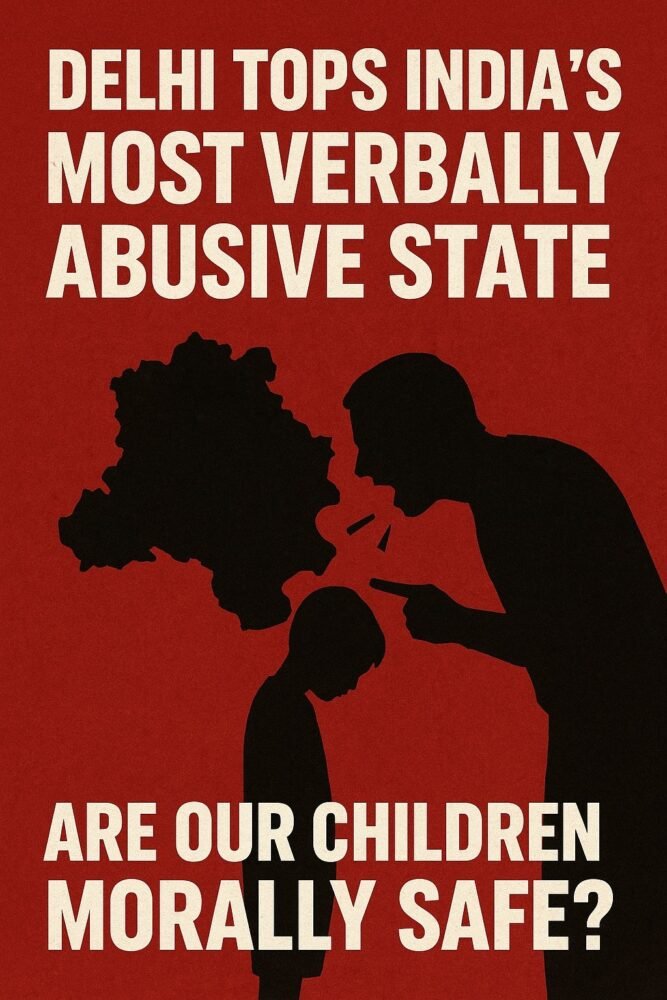Key Points:
-
Delhi ranks highest in verbal abuse across Indian states.
-
Survey by Gaali Band Ghar Abhiyan covered over 70,000 respondents.
-
80% in Delhi reported routine use of abusive language.
-
Experts worry about rising aggression among youth and declining moral values.
-
Children increasingly exposed to profanity in homes, schools, and media.
-
Call for urgent reforms in parenting, education, and cultural behavior.
The Alarming Reality in the Capital
Delhi, India’s bustling capital known for its rich history and vibrant energy, has now found itself at the top of a far more troubling list — the most verbally abusive state in the country.
According to a nationwide survey conducted by the Gaali Band Ghar Abhiyan, a decade-long campaign led by social activist and professor Sunil Jaglan, 80% of Delhi respondents admitted to using or encountering abusive language regularly. This includes phrases targeting family members, especially mothers and sisters — a disturbing trend that has become normalized in the capital’s streets, homes, and even schools.
A Culture of Casual Cruelty
The survey covered more than 70,000 participants from both rural and urban India, including working professionals, students, homemakers, and public service workers. What emerged is a deeply embedded culture where foul language is often excused as stress relief, humor, or even affection.
But experts warn: what we normalize today becomes tomorrow’s standard — and the implications for children are particularly grave.
“In Delhi, abusive words are used so casually that even young children hear them daily — in traffic, in markets, or at home. This shapes their understanding of communication and relationships,” said psychologist Dr. Meeta Sharma. “It can result in reduced empathy, higher aggression, and emotional desensitization.”
Children Caught in the Crossfire
The biggest victims of this linguistic aggression may not be the recipients of the abuse, but the bystanders — the children — who absorb, imitate, and internalize this language as part of everyday life.
When asked, 20% of Gen Z respondents blamed OTT platforms, social media, and video games for influencing their language. But the influence isn’t just digital — it’s domestic. Many children grow up in environments where adults, often parents, freely use vulgar terms during arguments, jokes, or even general conversation.
This early exposure affects more than just vocabulary. It erodes respect, weakens self-restraint, and fosters a mindset where anger and dominance override empathy and dialogue.
More Than a Delhi Problem
While Delhi leads the list, it’s not alone. The report ranked Punjab (78%), Uttar Pradesh and Bihar (74%) next in line, indicating a broader North Indian trend. However, Delhi’s urban intensity, traffic congestion, and high-stress environment appear to amplify this verbal aggression, making it a hotspot.
What’s more troubling is the gender neutrality of abuse. While men remain the majority users, 30% of women admitted to either using or tolerating abuse regularly — suggesting the problem is not only deep but also widespread across demographics.
A Wake-Up Call for Parents and Educators
Experts emphasize that home is the first classroom, and if parents use abusive language in front of children, they are effectively endorsing it.
“Children don’t just listen — they imitate,” said retired school principal Kavita Jha. “If we don’t model respectful communication, how can we expect them to learn values?”
Schools too must evolve. Moral science lessons need to be replaced by value-based experiential learning, including workshops on communication ethics, empathy, and conflict resolution.
What Needs to Be Done?
To reverse this trend and provide a safer environment for children’s moral and emotional development, several steps are necessary:
-
Parental Guidance: Monitor children’s exposure to abusive content and language. Set clear behavioral examples at home.
-
School Reforms: Introduce emotional intelligence and communication skills in the curriculum. Encourage discussion-based moral education.
-
Civic Campaigns: Amplify campaigns like Gaali Band Ghar Abhiyan to reach urban youth through influencers, short films, and public figures.
-
Media Responsibility: Urge content creators to avoid glorifying profanity and instead highlight respectful, impactful dialogue.
-
Community Leadership: Politicians, teachers, and religious leaders must lead by example in language use and public behavior.
The Path Forward
This isn’t just about cleaning up language. It’s about redefining our values. If children grow up believing that shouting and swearing are acceptable, even admirable, we will be nurturing a society that is emotionally volatile and morally adrift.
Delhi may be number one on this list — but it also has the power to lead the way toward change. By recognizing the damage and taking proactive steps, the capital can transform its reputation from the most abusive to the most aware.
Because in the end, it’s not just about words — it’s about the world we build with them.








